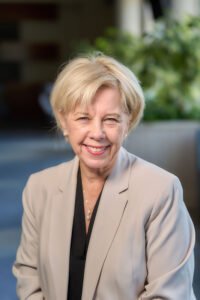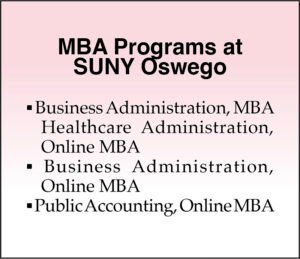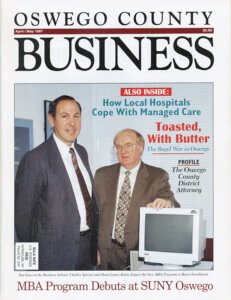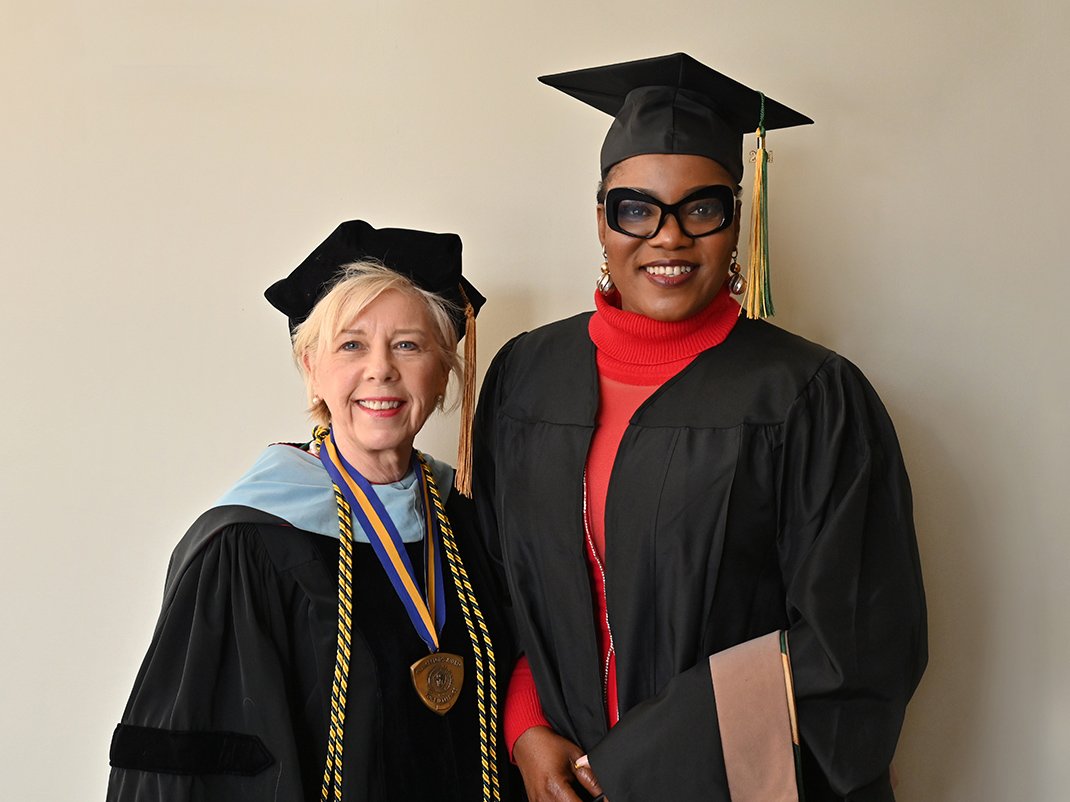Local program is the top MBA in the SUNY system
By Stefan Yablonski

In the fall of 1996, SUNY Oswego opened its doors to students who wanted an MBA degree, making the college the only public college within 100 miles to offer the degree. The new course of study officially kicked off with the fall 1997 semester.
“We are really delivering programs that the world needs today in business. At the end of the day, that’s what counts,” said Irene Scruton, assistant dean and director of MBA programs at SUNY Oswego.
Scruton joined SUNY Oswego as director of MBA Programs in 2013. She is responsible for the MBA portfolio, which includes full-time, part-time, campus, hybrid and online programs for management, public accounting, health services administration and five-year programs.
“People are taking their time and their money and they are investing in us to help them advance their careers to be the best that they can be. We don’t take that lightly.”
SUNY Oswego’s MBA programs are in the top 5% of business schools globally.
It used to be a degree in management and an MBA in accounting. In 2011 the school added an MBA online — it’s an MBA in management, but it is delivered online, Scruton added.
Then in 2013 the school added the MBA in healthcare administration.
They are all Master of Business Administration — recognized globally.
“The MBA in management is what I would call the general MBA,” she said. “What makes our program so great is students pick their course — do they want to spend time in marketing, supply chain, product management, finance — whatever. They can take a little bit of everything. That’s a straight MBA.
“The MBA in healthcare has the core of an MBA; you’re going to get what the business community expects … finance, marketing, human resources, but then you also take on specialty courses in healthcare MBA. So you’d also take healthcare finance and healthcare systems and healthcare policy. You still have an MBA — it’s all grounded in business, but it is all related to the healthcare industry. Same with accounting; the MBA core, but then you take specialty courses in accounting so that you are eligible for your CPA credential.”
The MBA program is just approaching 300 students now from when it started. In the last three years it had tremendous growth, she added.
“This year, when I looked at spring enrollment, we were at 367. And let’s see, that’s 2025; in 2020 we were at 247. So you can see we’ve had steady growth in enrollment all across the board,” she said. “Our MBA online is our largest program. Our healthcare is our second largest program. We have a great reputation in the healthcare field. Our students come from all over New York state. So we are very proud of that program.”
The program also has some international students, about 10% in the last few years.
“We have students right now, we have someone from Nigeria, India, China, there’s someone from Ghana. So we do have a sprinkling of international students. We are tracking on the international scene. Some of it depends on how the dollar is doing globally because it makes it very expensive to come here. We still actively recruit internationally. We don’t rely on the international students for our enrollment like some schools do. But we have a good representation,” she said.
Favorable tuition
 “The majority of our students in the MBA are from New York state because of tuition favorability for in-state residents. We have a sprinkling of students from surrounding states, but it’s probably less than 10%. When you have in-state tuition it makes it more affordable,” Scruton explained. “We are the top MBA program in the SUNY system. It’s a huge value proposition for the students. Oh my gosh — yes tremendously [less expensive]. Syracuse University, for example, is a private institution. I always say that one credit at a private institution is sometimes equivalent to one course at our institution. They all have quality programs, but they are private and their tuition is much higher.”
“The majority of our students in the MBA are from New York state because of tuition favorability for in-state residents. We have a sprinkling of students from surrounding states, but it’s probably less than 10%. When you have in-state tuition it makes it more affordable,” Scruton explained. “We are the top MBA program in the SUNY system. It’s a huge value proposition for the students. Oh my gosh — yes tremendously [less expensive]. Syracuse University, for example, is a private institution. I always say that one credit at a private institution is sometimes equivalent to one course at our institution. They all have quality programs, but they are private and their tuition is much higher.”
All of SUNY Oswego’s MBA programs are accredited through The Association to Advance Collegiate Schools of Business. This organization sets the standards for business school accreditation and has served as the academic regulator of university business programs since 1916. Less than 5% of business schools worldwide have earned AACSB accreditation.
“So you have this AACSB-accredited program and we are ranked nationally against some pretty big schools. You know the Carnegie Mellons of the world; Arizona, Illinois, Florida State. It’s a great value for New York state,” she said.
A third of the students are promoted while they are in the program. “So that says a lot about our program,” she added.
Another 20% were promoted after receiving their MBA either at their current employer or in a new position.
Support
“We have a lot of first-generation students. We take great pride in that. The first one in their family getting their master’s degree. They’ve done well in their career and now they are getting their MBA. Our student support model is very highly ranked. We have a concierge model. So once a student is admitted, they just deal with the MBA department. They don’t have to go to all the different departments on campus. We handle their advisement and they are with us for two to three years,” Scruton said. “For the most part, students are part-time. So they are going to be with us for a while. We work closely with them. The majority of our students — I’d say 80% of them — are working professionals. So that is a very unique audience. You really have to know how to work with them; they have work commitments, family commitments and life commitments. A lot can happen in a couple years. So we work closely with them to help them graduate. We have a very high graduation rate. We have a very high retention rate, some of the best in the industry.
“We help them stay in school and make sure they graduate. We do some career coaching. It keeps our team very busy. We have some really great people on our team. I am very proud of our whole office. The faculty is dedicated to our students. It makes for a really wonderful combination.”
Everyone on staff is dedicated to helping the student graduate, she added.
“We have excellent faculty. We don’t have separate faculty for online programming and our in-person programming. That is another reason why we are so highly ranked. Our faculty is housed in the business school. It is not in a separate division. So it is the same faculty who are on campus, who teach in class, who are teaching online,” she explained.
The majority of students now are online, because once online learning became popular across the country it is much more cost-effective for students than driving to campus losing the whole evening, she added.
Diverse student population
“We have students all over New York state. We have one woman who graduated; she was running a news station in New York City. She was a COO. Now she is a CEO. We have a doctor who was running the ER department at SUNY Upstate,” she said. “We don’t have the big names where you are picking up a magazine and seeing someone. But one of our graduates was on the cover of Syracuse Women as a premier doctor in Central New York.
“In the New York state area, our students are moving into CEO positions for Upstate New York companies, New York state health institutions. We are really proud of our graduates. They are all throughout New York. We have amazing students who have been able to use the MBA program to really elevate their careers, to elevate their projects.
Now we are teaching a lot of analytics in artificial intelligence; how to use it, how to use it in your business. We really work hard to keep our program relevant to what’s happening in this day and age. It really helps our students.
“The average age of our students is 35 years old. They are coming to us with, on average, eight years of work experience. So many of them have missed the changes in technology or they are using technology they might have had in college. And of course it is moving very quickly. The tendency is that they are apprehensive about it; they know they need to know about it, they want to use it. Our students are life-long learners. So we make sure that the courses that we offer are able to translate for them; not just what the technology is but how to use it in their work environment.”
Artificial intelligence
“What AI technology can help you in finance? Or if you are in HR what are the AI tools for HR?” she asked rhetorically. “Students are able to at least talk about it and help improve productivity in their own work space or get excited about it and go on to learn more about it.
“It is the same thing with analytic. It’s not about how to collect data. It’s about how to use data and ask the right question about the data. That’s what sets our students apart.”
SUNY Oswego MBA has what’s called continuous improvement.
“We are always adding electives that are relevant. We are talking about offering a port management course in the spring. We are excited about that. We are a port city. There are ports all across the country. So we are adding a sequence about managing ports. We are very excited about that,” she said. “And of course we are adding a whole new MBA degree in business analytics and applied AI. So we are very excited about that. It is going through all the approval process right now. That will be a new MBA to address current industry needs. We’ve developed a couple micro credentials where we are packaging some of our MBA courses. We are developing those for this semester.”
MBA Program Debuted in 1997
 The SUNY Oswego MBA program was launched in the fall 1997, spearheaded by then-dean Lanny Karns and graduate studies director Charles Spector. They both appeared on the cover of the April/May 1997 issue of Oswego County Business Magazine.
The SUNY Oswego MBA program was launched in the fall 1997, spearheaded by then-dean Lanny Karns and graduate studies director Charles Spector. They both appeared on the cover of the April/May 1997 issue of Oswego County Business Magazine.
“The new program, which will be in full swing this fall, gives the local college the distinction of being the only four-year school in the SUNY system to offer a master’s degree in business administration,” read a story in the issue.
Then SUNY Oswego President Deborah Stanley wrote:
“The MBA expands and strengthens our bonds with business and industry in our region. This is an initiative we have pursued in multiple ways over the past decade — from business-school partnerships like Project SMART, to the new Center for Business and Community Programs directed by Carolyn Rush, which encompasses workforce development, Leadership Oswego County and other vital services to the community.”




